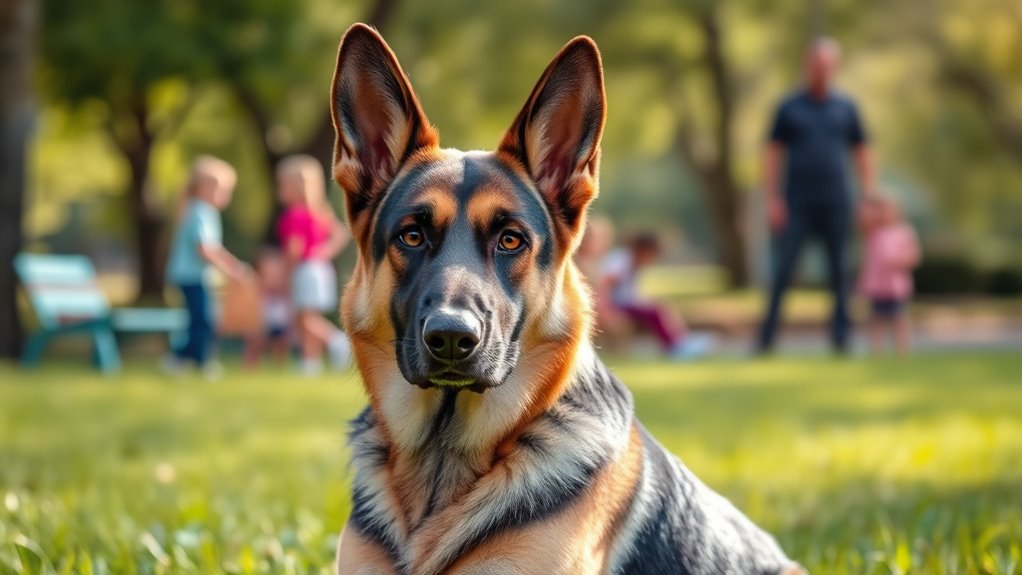German Shepherds are confident, intelligent, loyal, and versatile dogs. Their temperament is shaped by genetics, lineage, and socialization, making them responsive and alert. Proper training and early socialization help prevent shyness or aggression while fostering confidence and friendliness. Environmental factors like space, social interaction, and enrichment influence their behavior. To understand how to nurture a balanced, well-behaved German Shepherd, you’ll find more useful insights if you explore further.
Key Takeaways
- German Shepherds are intelligent, loyal, and versatile, with temperament influenced by genetics, lineage, and responsible breeding standards.
- Proper socialization from puppyhood is essential to develop confidence, friendliness, and reduce shyness or aggression.
- Consistent training using positive reinforcement helps shape well-behaved, balanced behaviors and enhances their responsiveness.
- Environmental factors like space, enrichment, and social interactions significantly impact their emotional stability and confidence.
- Breed stereotypes are often exaggerated; individual temperament varies based on training, socialization, and personal experiences.
Key Characteristics of German Shepherds

German Shepherds are renowned for their intelligence, loyalty, and versatility. You’ll find that their grooming needs are moderate; regular brushing helps control shedding and keeps their coat healthy. They thrive on a balanced diet tailored to their nutritional requirements, which include high-quality protein, healthy fats, and essential vitamins. Proper nutrition supports their energy levels and overall health. These dogs are active and intelligent, requiring consistent grooming to prevent matting and skin issues. Their diet should be carefully monitored to ensure prime growth and stamina. Incorporating mindfulness techniques into their routine can help reduce stress and promote overall well-being. Regular exercise and mental stimulation are also crucial for their development. Additionally, understanding their temperament can help owners better meet their needs and foster a strong bond. By maintaining a consistent grooming routine and providing proper nutrition, you help your German Shepherd stay healthy, happy, and at their best. Their key characteristics make them outstanding companions and working dogs. Engaging in regular training sessions can further enhance their behavior and responsiveness. Recognizing their trainability can lead to more effective obedience and a stronger bond with their owner.
Temperament Traits and Behavioral Tendencies

Because of their strong drive and intelligence, German Shepherds tend to be confident, alert, and responsive. They thrive on puppy socialization, which shapes their behavior and helps prevent shyness or aggression. Early exposure to different people, environments, and other animals makes them well-rounded. Their grooming needs are moderate; regular brushing keeps their coat healthy, and early grooming sessions reduce future resistance. Incorporating self watering plant pots into their routine can help maintain a clean and organized living space for both pets and owners. Additionally, understanding their temperament traits can aid in providing appropriate training and socialization strategies. Recognizing their emotional regulation needs further supports their well-being and adaptability in various environments, especially considering their behavioral tendencies that can be influenced by early social experiences.
The Impact of Genetics and Lineage

Your German Shepherd’s temperament is greatly influenced by its genetics and lineage, which are shaped by breeding standards. The behavior traits you see often link directly to specific bloodlines, making some lines more suited for work or companionship. Since genetic traits can vary widely, understanding a dog’s lineage helps you anticipate its natural tendencies and behavior. Additionally, awareness of practical support options can be beneficial in managing health or safety concerns related to genetic predispositions. Recognizing the importance of genetic diversity can also help in selecting healthier, more adaptable dogs for various roles. Considering the influence of personality traits inherent in different bloodlines can further assist in choosing a dog that aligns with your lifestyle and expectations.
Breeding Standards Influence
Breeding standards play a crucial role in shaping the temperament of German Shepherds by emphasizing specific genetic traits and lineage qualities. When breeders prioritize these standards, they influence not only a dog’s behavior but also its overall health and resilience. Proper puppy nutrition from a young age supports healthy development, which can enhance temperament stability. Grooming routines, while often seen as maintenance, also reflect the breed’s genetics, as well-groomed dogs tend to be more comfortable and less stressed. Responsible breeding ensures desirable traits like confidence, alertness, and sociability are passed down, resulting in a more predictable temperament. By adhering to strict standards, breeders help produce German Shepherds with balanced personalities and good health, directly impacting their behavior and interaction with people and other animals.
Lineage and Behavior Links
Lineage and genetics play a pivotal role in shaping a German Shepherd’s behavior, as certain traits are passed down through bloodlines. Your dog’s temperament can be influenced by its ancestors, making it important to understand lineage links. For example, working-line German Shepherds may be more alert and protective, while show-line dogs tend to be calmer. Proper puppy nutrition and grooming routines support healthy development, reinforcing positive behaviors. To illustrate, consider the following traits linked to lineage:
| Lineage Type | Typical Behavior Traits |
|---|---|
| Working | Alert, protective, energetic |
| Show | Calm, sociable, confident |
| Hybrid | Balanced, adaptable, trainable |
Genetic Traits Variability
Have you ever wondered how much genetics influence a German Shepherd’s temperament? It’s significant, as lineage impacts traits like energy levels, trainability, and even flea resistance. Some lines have a natural resilience to pests, reducing the need for frequent treatments, while others may require more diligent grooming to prevent skin issues. Genetic traits can also affect coat type, influencing grooming needs—shorter coats often need less upkeep, whereas longer or denser coats demand regular brushing. Variability within the breed means that not all German Shepherds will have the same temperament or health predispositions. Understanding this genetic diversity can help you select a dog that aligns with your lifestyle and expectations, ultimately promoting better health and behavior. Knowledge of heritage and lineage further emphasizes the importance of choosing a reputable breeder who prioritizes genetic health testing. Recognizing the breed-specific traits can also assist in tailoring training and socialization approaches to fit individual dogs.
Common Myths About German Shepherds

Many people believe that German Shepherds are inherently aggressive or overly protective, but this isn’t true for every dog. These German Shepherd myths often stem from breed stereotypes that exaggerate certain traits. While they are protective by nature, responsible training and socialization shape their behavior, making them friendly and well-behaved companions. It’s important to remember that individual temperament varies and isn’t dictated solely by breed. Unfortunately, misconceptions can lead potential owners to overlook these individual temperaments or to misjudge their true nature. Proper socialization and training are essential in ensuring a German Shepherd’s behavior aligns with a positive temperament. Understanding that breed stereotypes are often based on misconceptions rather than facts can help foster more accurate perceptions. Recognizing the importance of proper socialization can significantly influence a German Shepherd’s temperament positively. Additionally, training techniques tailored to the breed can further enhance their friendly and balanced disposition. By understanding the realities behind breed stereotypes, you can better appreciate the unique qualities of each German Shepherd and avoid unfair judgments based on outdated myths.
Training and Socialization Practices

You need to start socializing your German Shepherd early to help them become confident and well-behaved. Consistent training methods are key to establishing clear boundaries and expectations. By sticking to a reliable routine, you’ll set your dog up for success and build a strong, trusting relationship. Incorporating positive reinforcement techniques can further enhance your training efforts. Regular software quality assurance audits of your training process can help identify areas for improvement and ensure consistency. Additionally, understanding the essential gear for every prepper, such as water purification and first aid kits, can be beneficial for outdoor training activities. Recognizing the importance of eye patch benefits can also help address any behavioral challenges that may arise during training.
Early Socialization Importance
Early socialization plays a essential role in shaping a German Shepherd’s behavior and temperament. During this stage, exposing your puppy to various people, animals, and environments helps develop confidence and reduces future anxiety. Proper socialization also influences puppy playfulness, making your pup more adaptable and less aggressive. Consistent feeding routines support positive interactions and establish trust, which are indispensable during socialization periods. To deepen this process, consider the following:
| Socialization Aspect | Key Focus | Benefits |
|---|---|---|
| Puppy Playfulness | Encourage gentle play | Builds confidence and reduces fear |
| Meeting People | Introduce diverse individuals | Promotes friendliness |
| Introducing Other Pets | Supervised interactions | Prevents aggression |
| New Environments | Short outings | Increases adaptability |
| Feeding Routines | Regular schedule | Reinforces trust and calmness |
Additionally, understanding temperament traits of German Shepherds can help guide effective socialization strategies.
Consistent Training Methods
Consistent training methods are essential for shaping a well-behaved and balanced German Shepherd. This consistency supports proper puppy development and helps your dog understand expectations. By sticking to a routine, you reinforce positive behaviors and prevent confusion. Remember to contemplate your dog’s dietary needs, as nutrition influences behavior and energy levels during training. To stay effective, incorporate these practices:
- Use clear, simple commands and positive reinforcement
- Maintain a regular training schedule
- Be patient and persistent, avoiding punishment
- Adjust training based on your dog’s age and dietary needs
Consistency helps your German Shepherd develop confidence and trust. It also ensures socialization remains effective, creating a well-rounded companion. With steady, unified methods, your dog learns faster and adapts better to new situations.
Environmental Factors Influencing Behavior

Environmental factors play a significant role in shaping a German Shepherd’s temperament, with their surroundings influencing behavior and personality traits. Proper environmental enrichment stimulates their mind and body, reducing boredom and destructive behaviors. Housing conditions, including space and comfort, affect their confidence and stress levels. A well-maintained environment encourages positive behaviors and emotional well-being. Conversely, poor housing or lack of stimulation can lead to anxiety or aggression. Ensuring your dog has access to toys, social interaction, and a safe space promotes a balanced temperament. The table below highlights key environmental influences:
| Factor | Impact | Example |
|---|---|---|
| Environmental Enrichment | Mental and physical stimulation | Interactive toys |
| Housing Conditions | Comfort and safety | Spacious, clean shelter |
| Social Interaction | Confidence and sociability | Regular human and dog contact |
| Boredom Prevention | Reduces destructive behaviors | Daily walks and play |
| Stress Levels | Emotional stability | Quiet, secure environment |
Tips for Fostering a Well-Balanced German Shepherd

Creating a balanced German Shepherd starts with intentional efforts to nurture their physical and emotional well-being. To achieve this, focus on consistent grooming needs and tailored exercise routines. Proper grooming keeps their coat healthy and prevents skin issues, while regular exercise channels their energy positively. You can enhance their balance by:
- Establishing daily exercise routines that include walks, play, and mental stimulation
- Providing regular grooming to maintain coat health and reduce stress
- Training with positive reinforcement to build confidence and emotional stability
- Ensuring socialization with other dogs and people to foster well-rounded behavior
Frequently Asked Questions
How Do German Shepherds Interact With Children and Other Pets?
You’ll find that German Shepherds often interact well with children and other pets when properly socialized. Dog socialization helps them develop confidence and friendliness, reducing territorial instincts that might cause guarding or aggression. It’s important to introduce them gradually and positively. With consistent training and socialization, they become loyal, protective, and gentle companions who enjoy playing with kids and coexist peacefully with other animals in your home.
What Health Issues Most Commonly Affect German Shepherds’ Behavior?
They say a healthy dog is a happy dog, and that couldn’t be more true. Common health issues like hip dysplasia, elbow problems, and eye conditions stem from genetic disorders, which can cause discomfort and sometimes lead to health-related aggression. If you keep up with regular vet visits and proper care, you help make sure your German Shepherd stays balanced and well-behaved, avoiding problems that can affect their behavior.
How Does the Age of a German Shepherd Influence Its Temperament?
As your German Shepherd ages, you’ll notice changes in their temperament. During puppy development, they’re energetic, curious, and enthusiastic to learn. As they mature, they become more confident and focused. In their senior years, their temperament often softens; they may become calmer and more affectionate. You’ll see these shifts firsthand, helping you better understand their needs and how to provide appropriate care at each life stage.
Are German Shepherds Suitable for Apartment Living?
Imagine fitting a mighty German Shepherd into a tiny apartment—sounds impossible, right? Well, they can adapt, but you must consider apartment suitability and noise sensitivity. German Shepherds thrive with space and mental stimulation, so cramped environments challenge their nature. If you’re ready to provide daily exercise, training, and lots of mental activity, they can become loyal apartment companions. Just be prepared for some barking if they’re noise-sensitive!
What Are Signs of Stress or Anxiety in German Shepherds?
You’ll notice signs of stress or anxiety in your German Shepherd through body language cues like pacing, lip licking, or yawning. They may also show increased vocalizations, such as whining or barking. Keep an eye on sudden changes in behavior, restlessness, or avoiding eye contact. Recognizing these signs early helps you comfort and reassure your dog, reducing their anxiety and ensuring they feel safe and secure.
Conclusion
Understanding your German Shepherd’s temperament means embracing their intelligence, energy, and loyalty. By knowing their traits, challenging myths, and providing proper training and socialization, you create a bond built on trust and respect. You shape their behavior, nurture their confidence, and foster their protective nature. With patience and consistency, you guide your German Shepherd to thrive—strengthening your connection, enriching your life, and ensuring a happy, well-balanced companion for years to come.









